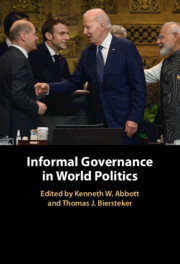Book contents
- Informal Governance in World Politics
- Informal Governance in World Politics
- Copyright page
- Contents
- Figures
- Tables
- Contributors
- Preface
- Acknowledgments
- Abbreviations
- Part I Introduction
- Part II Informality of Institutions
- 2 From Complex Interdependence to Complex Governance
- 3 Soft Pooling
- 4 Informal Governance in the Development Regime
- 5 Informal Governance of International Climate Policy
- 6 Why Do States Cooperate Informally?
- Part III Informality within Institutions
- Part IV Informality around Institutions
- Part V Normative Issues
- Part VI Conclusion
- References
- Index
6 - Why Do States Cooperate Informally?
Comparing Secret Agreements in Europe and the Middle East
from Part II - Informality of Institutions
Published online by Cambridge University Press: 23 May 2024
- Informal Governance in World Politics
- Informal Governance in World Politics
- Copyright page
- Contents
- Figures
- Tables
- Contributors
- Preface
- Acknowledgments
- Abbreviations
- Part I Introduction
- Part II Informality of Institutions
- 2 From Complex Interdependence to Complex Governance
- 3 Soft Pooling
- 4 Informal Governance in the Development Regime
- 5 Informal Governance of International Climate Policy
- 6 Why Do States Cooperate Informally?
- Part III Informality within Institutions
- Part IV Informality around Institutions
- Part V Normative Issues
- Part VI Conclusion
- References
- Index
Summary
Although states of most types receive distinct advantages when they formalize their cooperation through public, legally binding agreements, we argue that absolute monarchs are uniquely able to capture personal benefits from secret, cartel-like cooperation. Domestic decision-making in absolute monarchies is unchecked, nontransparent, and highly personal, and these norms reproduce themselves at the international level when absolute monarchs cooperate with each other. We assess the explanatory strength of our theory through two in-depth case studies. First, we examine how the Austrian, Prussian, and Russian monarchs used informal agreements strategically during the Concert of Europe to suppress domestic unrest. Second, we explore how the Iraqi, Jordanian, and Saudi monarchs used secret agreements to counter domestic pro-republican sentiment in the late 1950s and early 1960s. Irrespective of geography, religion, and time period, the nontransparent and unilateral manner with which absolute monarchs implement domestic policies facilitates and encourages this type of informal cooperation.
Keywords
- Type
- Chapter
- Information
- Informal Governance in World Politics , pp. 130 - 158Publisher: Cambridge University PressPrint publication year: 2024

